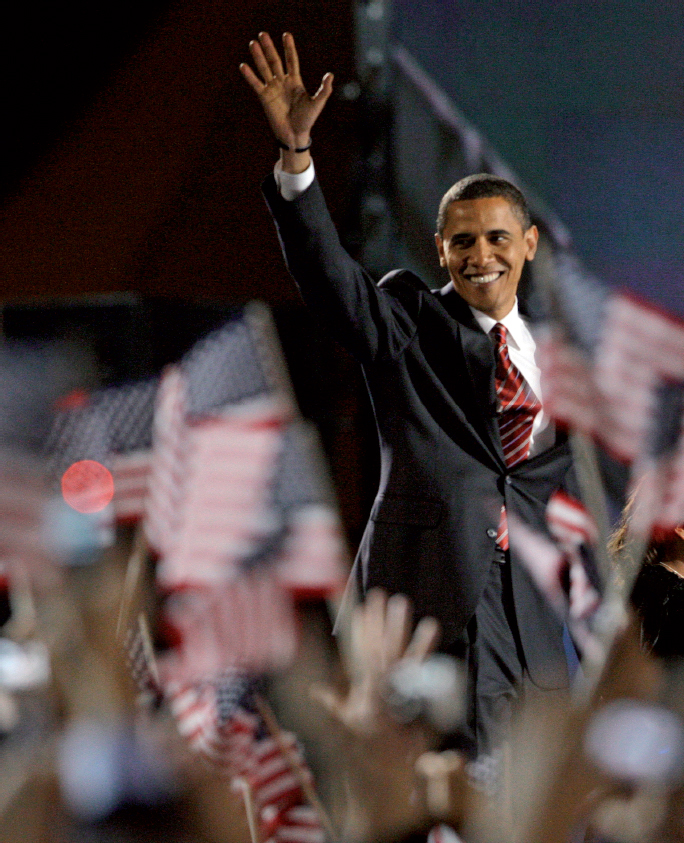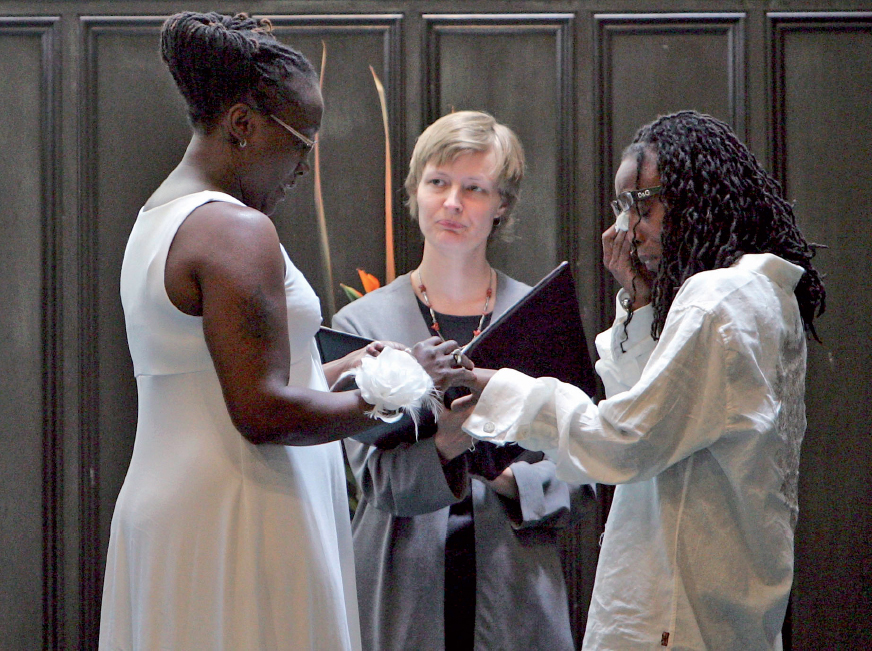The Rise of Barack Obama
In the midst of the Great Recession, the United States held the 2008 presidential election. The Republican candidate, John McCain, was a Vietnam War hero and a longtime senator from Arizona. His Democratic opponent was Barack Obama, who was a young boy during the Vietnam War and had served a mere four years in the Senate from Illinois. For their vice presidential running mates, McCain chose Sarah Palin, the first-term governor of Alaska, and Obama selected Joseph Biden, the senior senator from Delaware. Whoever won would represent a break with tradition. If McCain triumphed, for the first time a woman would serve as vice president. An Obama victory would place an African American in the White House for the first time in history.
In the end, Obama overcame lingering racial prejudices in the country by speaking eloquently about his background as an interracial child, the son of an immigrant from Kenya and the grandson of a World War II veteran from Kansas. He also refuted charges that he was a Muslim (he is a Christian), that he was not born in the United States (he was born in Hawaii), and that he associated with terrorists (in the 1990s, he had participated in a few Chicago civic engagements with a past 1960s radical). The former community organizer succeeded in building a nationwide, grassroots political movement through digital technology. He raised an enormous amount of campaign money from ordinary donors through the Internet and used Web sites and text messaging to mobilize his supporters. Obama won the presidential election most of all because the public blamed the Bush administration for the recession, and Obama offered hope—“Yes we can” was his campaign slogan—for economic recovery. Obama captured 53 percent of the popular vote, obtaining a majority of votes from African Americans, Latinos, women, and the young, who turned out in record numbers, and a comfortable 365 electoral votes. The Democrats also scored big victories in the House and Senate.
Yet the election of President Obama did not erase the impact of generations of racism from the United States or usher in what some have called a “postracial” America. From 1975 to 2002, the number of black elected officials in the United States increased from around 3,500 to more than 9,000. African Americans had also made significant economic progress as a result of antidiscrimination laws and affirmative action, expanding the size of the black middle class. However, the racial gap in wealth, education, and rates of incarceration remained wide. In 2006 the median income for blacks was $32,132, compared with $50,673 for whites. About 75 percent of whites owned their home, compared with slightly less than 50 percent for blacks, a reflection of the continued disparity in wealth between the races. By 2008 approximately 24 percent of African Americans (compared with 8 percent of whites) lived in poverty, nearly double the national poverty rate of 12.7 percent. The percentage of whites who received a bachelor’s degree was almost double that for blacks. More than 28 percent of black men were expected to be imprisoned during their lifetime, compared with 4 percent for whites. More than half the prison population in the United States is black and another quarter Latino, far out of proportion with their percentages among the total U.S. population.
Despite the persistence of racism, President Obama achieved notable victories during his first term in office. He continued the Bush administration’s bailout of collapsing banks and investment firms and expanded it to include American automobile companies, which within three years bounced back, became profitable again, and began paying back the government for the bailout. The president supported passage of an economic stimulus plan that provided federal funds to state and local governments to create jobs and keep their employees, including teachers, on the public payroll. Congress also extended the period of unemployment insurance benefits. More controversially, President Obama pushed Congress to pass a health care reform measure, which mandated that all Americans had to obtain health insurance and that no one could be denied coverage for a preexisting condition. He also signed into law repeal of the “don’t ask, don’t tell” policy, which discriminated against gays in the military. Although the Supreme Court in 2003 had declared unconstitutional a Texas law making homosexual acts a crime, the issue of same-sex marriage remained unresolved. Initially Obama supported civil unions rather than gay marriage, but in 2012 he declared his support for same-sex marriage.

In foreign affairs, the president appointed Hillary Clinton, the former First Lady and a senator from New York, as secretary of state. The U.S. military increased combat troop withdrawals from Iraq and turned over security for the country to the newly elected Iraqi government. At the same time, the Obama administration stepped up the war in Afghanistan by increasing U.S. troop levels, which led to a rise in casualties. Still, the president pledged withdrawal of combat soldiers by 2014. His most dramatic success came in 2011, when U.S. special forces killed Osama bin Laden in his hideout in Pakistan. The Obama administration also persuaded the Senate to approve the renewal of a nuclear disarmament treaty with Russia.
President Obama continued to encounter vigorous political opposition. Most Republican lawmakers refused to support his economic stimulus and health care reform bills. A group of Republican conservatives formed the Tea Party movement, which they named after colonial Americans who sought to topple British rule. Its followers attacked the president as a “socialist” for what they perceived as an effort to expand federal control over the economy and diminish individual liberty with passage of the health care act. The Fox News media empire, owned by Rupert Murdoch, backed this movement and its leaders, such as Sarah Palin and talk-show host Glenn Beck.
Obama encountered growing political difficulties because the economy remained stagnant. The president did save the financial system from collapse, and the stock market had rebounded by 2012, but unemployment remained over 8 percent (a drop from its high of 10.2 percent). As millions of people remained out of work, a resurgent Wall Street rewarded its managers and employees with big financial bonuses. Large corporations earned millions of dollars in profits but did not create new jobs. The 2010 midterm elections illustrated the growing dissatisfaction of American voters, as Republicans regained control of the House and the Democratic majority in the Senate narrowed. The Tea Party flexed its electoral muscle in successfully campaigning for Republican congressional and gubernatorial candidates who supported its positions. Exit polls showed that 41 percent of the voters endorsed the Tea Party movement. Governor Scott Walker of Wisconsin, backed by the Tea Party, took aim at public employee unions in his state and signed into law a measure limiting collective bargaining. (In 2012 his opponents failed to win a recall election to remove him from office.)

Dissent also came from the left. In 2011 protesters in cities around the nation launched the Occupy Wall Street movement, which attacked corporate greed, economic inequality, and the inability of the federal government to relieve the widespread suffering. Many in the movement were inspired to act by massive cuts in education spending, crippling state budget deficits and declining tax revenues that slashed social services, decaying infrastructure, and crushing student loan debts. These and other Americans continued to be concerned about environmental issues, including dependence on foreign oil, global warming, and air and water pollution.
With unemployment remaining high, economic growth moving at a slow pace, and a number of European economies still in recession and unable to pay mounting debts, the economy loomed as the top issue in the 2012 presidential election. The Republican nominee, Mitt Romney, the former governor of Massachusetts, appealed to conservative voters by opposing Obama’s economic programs, including health care reform, and by embracing the social agenda of the Christian Right. Although admitting that much remained to be done, Obama defended his record on creating new jobs, reducing unemployment, and rescuing the automobile industry. He also criticized economic inequality in the country and promised to raise taxes on the rich. Despite the slower-than-expected economic recovery, Barack Obama won reelection by holding together his coalition of African American, Latino, female, young, and lower-income voters.
Explore
See Documents 29.3 and 29.4 for testimonies from the Great Recession.